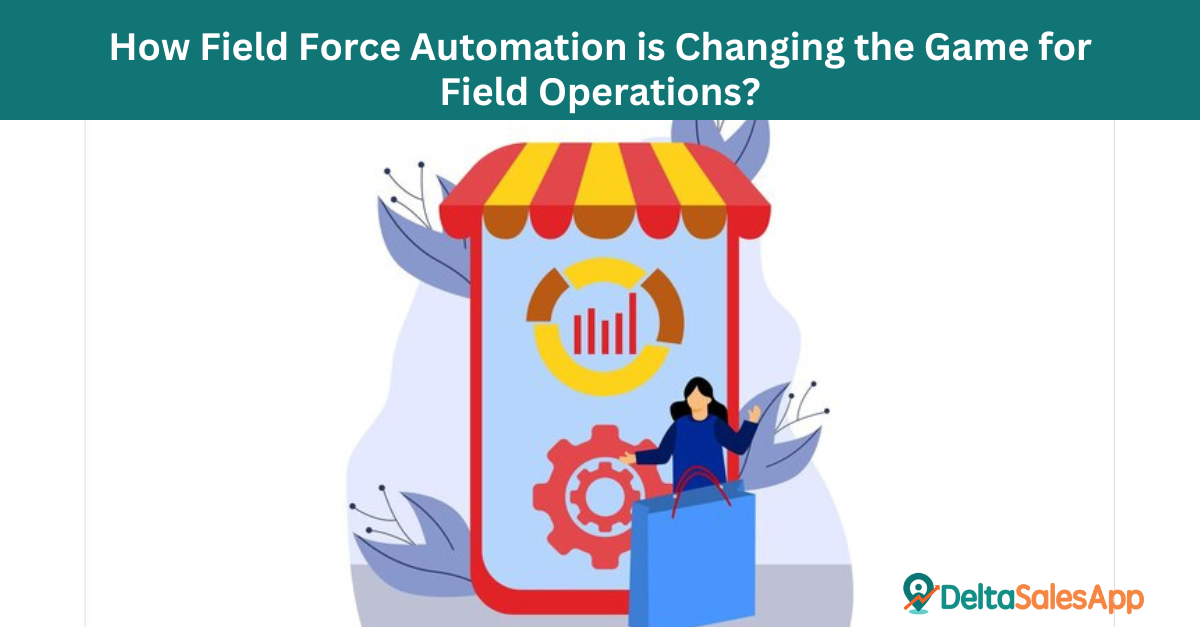How Field Force Automation is Changing the Game for Field Operations?

In today’s fast-paced business environment, efficiency, precision, and speed are paramount to success. For industries that rely on a workforce out in the field—whether it’s delivering services, conducting inspections, or maintaining equipment—streamlining operations and maximizing the productivity of field agents is critical. Enter Field Force Automation, a transformative technology that is revolutionizing how businesses manage and optimize their field operations.
But what exactly is Field Force Automation, and why is it becoming a game-changer for industries around the globe? In this blog post, we will explore the concept of Field Force Automation, its underlying technologies, its unique benefits, and how it’s reshaping various industries. Let’s take a deep dive into this exciting world of field service automation.
The Shift to Automated Field Operations: What is Field Force Automation?
At its core, Field Force Automation is the integration of mobile technologies, real-time data, and automation to optimize field operations. It is a comprehensive system that simplifies tasks like scheduling, dispatching, monitoring, and reporting for a mobile workforce, such as technicians, engineers, service agents, and delivery drivers.
This technology empowers field workers with mobile applications and cloud-based solutions that provide access to real-time information, automated workflows, and communication channels that keep them in sync with headquarters and customers. Through Field Force Automation, businesses are not just managing their field teams—they are enhancing their capabilities, enabling data-driven decisions, and delivering superior service.
Benefits You Can't Ignore: Why Field Force Automation is a Must-Have?
While Field Force Automation is often seen as a tool to boost productivity and efficiency, its benefits extend far beyond that. Here are the major reasons why businesses can’t afford to overlook the potential of Field Force Automation:
Hyper-Efficiency through Automation
Manual processes in field operations can be time-consuming and error-prone. FFA automates everything from scheduling to dispatching to reporting, drastically reducing human error and inefficiencies. Agents are no longer bogged down with paperwork, administrative overhead, or delays in receiving critical information. Instead, the system automatically updates tasks in real-time, ensuring that the workforce is always on track and moving forward.
This results in faster response times, fewer bottlenecks, and increased operational throughput. The magic here lies in allowing employees to focus on their core tasks—providing the actual service—rather than managing paperwork or sorting through data.
Seamless Communication & Data Accessibility
In the field, information is often outdated or incomplete by the time it reaches the agent. With FFA, field agents gain access to the most up-to-date information available, from customer history to inventory levels to asset conditions. This enables them to respond to service requests quickly and accurately, without the need for back-and-forth communication with the office.
Furthermore, real-time data exchange enhances communication between agents, customers, and the back office, ensuring that everyone is on the same page. Whether it's tracking the technician's progress or providing updates on unexpected delays, the transparency afforded by Field Force Automation significantly improves coordination.
Cost Optimization Like Never Before
In industries where field teams make up a significant portion of operational costs, optimizing these expenses is crucial. FFA offers unparalleled cost savings by eliminating inefficiencies such as missed appointments, unnecessary travel, and labor-intensive administrative tasks.
For example, advanced route optimization algorithms ensure that technicians take the most efficient routes to their destination, reducing fuel costs, travel time, and carbon footprints. Additionally, automated scheduling means field agents are dispatched based on proximity and skill level, reducing delays and increasing job completion rates.
Data-Driven Insights for Smarter Business Decisions
With all field operations automated and tracked, FFA platforms generate an enormous amount of valuable data. From customer satisfaction metrics to operational KPIs to field agent performance, businesses gain deep insights into their field operations. This wealth of information provides actionable intelligence that helps businesses make informed decisions, whether it’s identifying performance gaps, optimizing workflows, or predicting maintenance needs.
A powerful byproduct of this data is the ability to improve strategic planning. Business leaders can use insights from FFA systems to optimize staffing, inventory management, and even customer service policies, all based on solid data.
Customer Experience: Turning Field Service into a Competitive Advantage
In an age where customer experience is everything, FFA helps organizations provide service that not only meets but exceeds customer expectations. The ability to track field operations in real-time means customers can receive accurate updates about service times and potential delays.
Moreover, with detailed customer histories and service records at their fingertips, field agents can tailor their interactions to the specific needs and preferences of each customer. A technician arriving with the right tools, the right knowledge, and at the promised time enhances the entire customer experience and builds brand loyalty.
Key Technologies Behind Field Force Automation
What powers this incredible efficiency and effectiveness? Here are the key technologies that drive Field Force Automation and make it a transformative solution for businesses:
Mobile Apps: The Heart of FFA
Mobile applications are at the core of FFA solutions, allowing field agents to access all necessary information directly from their smartphones or tablets. These apps provide functionalities like work order management, customer details, inventory tracking, and real-time updates—everything an agent needs to complete tasks on-site.
With mobile apps, field agents can update job statuses, log service issues, capture signatures, and submit reports instantly, all while staying connected to the system and the team. This helps maintain consistency, accuracy, and efficiency across the board.
GPS and Route Optimization
GPS tracking is indispensable in field force operations. Not only does it provide real-time location tracking, but it also enables route optimization. By leveraging GPS data, FFA systems can ensure that field agents take the most efficient routes to job sites, cutting down on fuel consumption, travel time, and reducing the risk of late arrivals.
Moreover, dynamic routing algorithms can adjust to real-time traffic conditions, unexpected delays, or service cancellations, ensuring that service delivery remains uninterrupted and timely.
Cloud Computing: Anytime, Anywhere Access
Cloud technology enables centralized access to all data, applications, and systems used by field agents. Whether agents are in a remote area with limited connectivity or back at the office, they can access the information they need anytime, anywhere. Cloud computing allows businesses to store and manage vast amounts of data securely while ensuring its availability across devices and locations.
With cloud-based systems, businesses can scale quickly, expand their workforce, and remain agile in the face of changes in demand, all without being tied to a physical server.
Predictive Analytics & AI
Artificial intelligence (AI) and predictive analytics are transforming how businesses approach maintenance and service. With advanced algorithms, FFA systems can predict when equipment will need servicing or when a customer is likely to require follow-up support.
This predictive maintenance capability reduces unplanned downtime and minimizes the need for emergency repairs. Similarly, AI-powered chatbots and virtual assistants can streamline scheduling and customer interactions, enhancing service delivery even further.
Industries Driving the Adoption of Field Force Automation
Field Force Automation is not confined to a single industry—its impact spans across various sectors. Here are a few industries that are leading the charge:
1. Telecommunications
Telecom companies need technicians to maintain and upgrade network infrastructure. FFA streamlines service delivery by automating technician dispatch, optimizing routes, and providing technicians with real-time data on customer service histories. This ensures faster installations, repairs, and maintenance, all while reducing operational costs.
2. Utilities and Energy
Utility companies, whether in electricity, gas, or water services, rely on field agents to monitor, maintain, and repair infrastructure. FFA helps these companies minimize downtime, schedule preventive maintenance, and automate dispatch based on proximity and skill. By integrating IoT sensors and AI, utility companies can predict equipment failures before they happen, ensuring a more reliable service.
3. Healthcare
In home healthcare, agents such as nurses or technicians frequently travel to patients' homes. FFA simplifies scheduling, tracks medication delivery, and ensures that agents have access to the latest patient information. By improving operational efficiency, FFA enhances patient care and reduces errors, all while ensuring that caregivers have the right resources at hand.
4. Manufacturing and Construction
Manufacturing and construction businesses rely heavily on field technicians to perform on-site repairs, installations, and maintenance. With FFA, companies can ensure that their workers have access to up-to-date schematics, parts inventories, and project timelines. This helps prevent delays and improves the efficiency of field operations.
Sales Force Tracker and Field Sales Automation: Driving Sales Efficiency and Success
A Sales Force Tracker integrated with Field Sales Automation is a game-changer for optimizing sales team performance. While the Sales Force Tracker monitors and tracks real-time activities of sales representatives—such as customer visits, meetings, and sales progress—Field Sales Automation enhances this by automating critical processes like scheduling, route optimization, and data entry. This combination streamlines workflows, reduces administrative burden, and allows sales teams to focus more on building customer relationships and closing deals. With real-time insights and automated workflows, businesses can ensure better coordination, improve decision-making, and achieve higher sales productivity, all while driving overall business success.
The Road Ahead: The Future of Field Force Automation
The future of FFA is incredibly exciting. With advancements in AI, 5G networks, and IoT technologies, FFA systems will become even more intelligent, automated, and capable of anticipating and resolving issues before they arise.
Imagine a future where field agents are equipped with augmented reality glasses that guide them through repair processes step by step, or where drones and robots can carry out inspections, maintenance, and deliveries autonomously. The possibilities are endless, and businesses that embrace these innovations will be better equipped to thrive in a competitive landscape.
The Path to Smarter, More Efficient Field Operations
Field Force Automation is not just about replacing manual tasks—it’s about reimagining how field operations are conducted, optimizing workflows, enhancing communication, and empowering employees. As technology continues to advance, Field Force Automation systems will only become more sophisticated, offering businesses greater efficiency, lower costs, and improved customer satisfaction.
For companies in industries that rely on field agents, Field Force Automation is no longer a luxury but a strategic necessity. By harnessing the power of automation, data, and connectivity, businesses can unlock new levels of productivity and service excellence, setting the stage for long-term growth and success.









